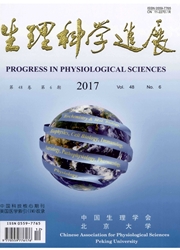

 中文摘要:
中文摘要:
雌激素与糖尿病的发生和发展有密切关系。新近研究表明,雌激素受体(estrogen receptor,ER)对物质代谢和能量平衡具有重要调节作用。雌激素可由核内ER介导,通过基因组机制,或膜上ER通过磷脂酰肌醇3-激酶/蛋白激酶B及胞外信号调节激酶信号转导通路,调节下丘脑神经元摄食和厌食神经肽的表达。下丘脑ERα基因沉默小鼠表现出典型的代谢综合征症状,提示中枢ERα能够影响外周能量代谢。进一步研究发现,中枢ERα和胰岛素以及瘦素信号转导通路存在交互作用。因此,阐明中枢ER调控能量代谢的机制,可为临床防治雌激素紊乱导致的糖和能量代谢异常提供新的思路。
 英文摘要:
英文摘要:
Estrogen is demonstrated to be involved in the development and progress of diabetes mellitus.Recently studies have indicated that estrogen receptor(ER) play a crucial role in the modulation of nutrients and energy metabolism.Estrogen could regulate the expressions of anorexia and hyperphagic neuropeptide in the hypothalamus by genomic actions via nuclear ER,or via membrane ER linking to the phosphatidylinositol 3-kinase(PI3-K)/Akt and ERK1/2 mitogen-activated protein kinase(MAPK) pathways.The mice with hypothalamic ERα silencing exhibited the features of typical metabolic syndrome,suggesting the role of ERα in peripheral nutrient metabolism.Further studies showed that the central ERα interacts with both insulin and leptin signaling pathways.The elucidation of the mechanism of central ER in energy balance and nutrient metabolism would provide the novel strategy to overcome the abnormality of glucose metabolism and energy imbalance induced by estrogen disorder in clinical settings.
 同期刊论文项目
同期刊论文项目
 同项目期刊论文
同项目期刊论文
 Association of high mobility group box-1 protein levels with sepsis and outcome of severely burned p
Association of high mobility group box-1 protein levels with sepsis and outcome of severely burned p Association between high mobility group box-1 protein release and immune function of dendritic cells
Association between high mobility group box-1 protein release and immune function of dendritic cells The effect of high-mobility group box 1 protein on activity of regulatory T cells after thermal inju
The effect of high-mobility group box 1 protein on activity of regulatory T cells after thermal inju The effect of a novel cytokine, high mobility group box-1 protein, on the development of traumatic s
The effect of a novel cytokine, high mobility group box-1 protein, on the development of traumatic s Stimulation of α7 nicotinic acetylcholine receptor by nicotine increases suppressive capacity of nat
Stimulation of α7 nicotinic acetylcholine receptor by nicotine increases suppressive capacity of nat 期刊信息
期刊信息
